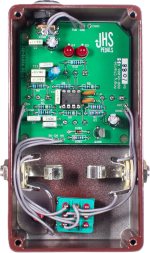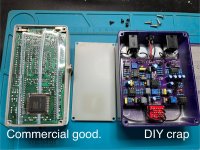In my opinion, it's hard to compare the industry and diy builders.
We need comparison criteria.
The industry like Boss or others have factories available for them, with expensive devices and machines to help them reach an optimal ratio between expenses and quality. Which can be both advantageous and an inconvenience. They can do reliable builds on a large scale, but they can't go too far with quality and craftmanship, for competitive issues. Industry prioritizes money benefits, which lead them to all kinds of compromises.
The level of a diy builder varies, depending on the level of interest for the project, the diy builder's experience, and the craftmanship knowledge.
Someone with 40 years experience, with some craftmanship background or skills, will be completely different than someone like me, a music player who just wanted to save money and try many circuits.
I mean, i mostly build kits. Fortunately, there are people like Klaus at musikding, who is able to source all the parts carefully and accurately and send them to me.
On forums like this one, i realized some builders spend countless hours sourcing parts, and it can become a great skill, increasing the build quality, depending on their level of electronic knowledge, experience in sourcing parts, and their budget.
Some diy builders are using bare aluminium enclosures and use a marker to write the controls, maybe a sticker to decorate the build, or a piece of paper slipped under the controls screws.
Other builders are real artists, working on the enclosure in their own singular way.
Using etching with great skills, or woodcraft, etc.
All these hours spent only on the enclosure will most certainly increase tremendously the overall build's quality.
I also built a few perfboard and veroboard projects, and i could see how different it is when we don't have a pcb. For me, that's where it becomes truely interesting in terms of craftmanship. All sorts of little details start to matter.
I can spend 6 hours on a kit, and 3 days or 3 weeks on a vero project if im trying to do everything right, the way some very experienced builders taught me to do things.
As a conclusion i'd say that some diy builds are ordinary, even mediocre, the builder didn't intend to make a piece of art, just a quick job to test some circuit, and move on.
On the other hand, some diy builds are remarquable, priceless, made with artistical intents, thanks to amazing craftmanship skills that can't be found in the industry.
Some diy builders are interested in playing guitar, they build the project as fast as they can, other builders are more interested in the building process and they'll focus on doing the best they can.





